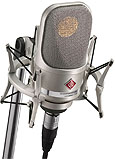|
Neumann TLM 107 Switchable Studio Microphone |
|

Product Code:
TLM107


|
Classic proportions combined with attractive
styling and fresh ideas � the TLM 107 perfectly embodies the Neumann philosophy:
Innovation based on tradition. Far from evoking vintage or retro nostalgia, the
standard-setting TLM 107 represents an impressive, modern studio microphone. Its
extensive performance spectrum and high-precision reproduction, very close to
the original, make the TLM 107 universally applicable, opening up the widest
freedom in mixing and post-production.
Neumann Engineering
The newly developed sound transducer, which was designed especially for this
microphone, is impressive with its outstanding impulse fidelity. The great
consistency of the five polar patterns, omnidirectional, cardioid and figure-8,
with the intermediate patterns wide-angle cardioid and hypercardioid, is also
unusual for a large-diaphragm capsule. The TLM 107 provides optimal sound not
only for the cardioid setting; it also ensures maximum precision over the entire
frequency range for all of the other directional characteristics. The sound
always remains balanced, with an almost linear reproduction up to 8 kHz, and a
slight boost in the highest frequencies that lends presence and freshness to the
voice. Here particular attention has been paid to the natural reproduction of
speech sounds, especially the critical �s� sound. The grille is acoustically
optimized for low sensitivity to pop sounds. In addition, the sound transducer
is edge-terminated, with both diaphragms at ground voltage. Specifically, this
ensures considerably reduced sensitivity to dust and humidity.
No-Compromise Sound Design
Transformerless circuitry permits a high degree of linearity and a large dynamic
range. The self-noise of only 10 dB-A is practically inaudible, while at the
same time, the TLM 107 features high level handling. The maximum sound pressure
level of 141 dB SPL can be increased to 153 dB SPL via pre-attenuation (Pad).
This enables the TLM 107 to transmit the sound of even the loudest instruments
without distortion. The Low Cut settings of Linear, 40 Hz, and 100 Hz are
precisely adapted to practical recording situations. Without side effects, the
40 Hz setting cuts interference noise below the range of fundamental tones
(where 41 Hz is the frequency of the double bass open E string), while the 100
Hz setting is optimized for speech and vocals (where 100 Hz corresponds to the
lowest notes of a baritone).
Innovative Operating Concept
For the first time, all of the microphone switch functions are controlled
intuitively via a navigation switch. A visual highlight is the illuminated
pattern display in the chrome ring, while the Pad and Low Cut status is
displayed by LEDs to the left and right of the switch. In order not to distract
singers, the switch and display are located on the back of the microphone. After
ten seconds, the displays are turned off automatically.
Delivery Package
The TLM 107 is available in the colors matte nickel and black. A stand mount (SG
2) is included.
Best Of Show Arard
Studio Microphone TLM 107 in Wooden Box
Studio Microphone TLM 107: Detail View
Studio Microphone TLM 107: Rear View
|
� Multipattern large diaphragm microphone
with 5 polar patterns (omni, wide cardioid, cardioid, hypercardioid,
figure-eight)
� Navigation switch with LED illuminated display for polar pattern, PAD and low
cut
� Sound characteristics: transparent, natural reproduction of human voice,
outstanding transient response
� Balanced sound in all 5 polar pattern settings |
| Acoustical
operating principle |
Pressure gradient
transducer |
| Directional
pattern |
Omni, wide angle cardioid,
cardioid, hypercardioid, figure-8 |
| Frequency
range |
20 Hz ... 20 kHz |
| Sensitivity
at 1 kHz into 1 kohms |
11 mV/Pa |
| Rated
impedance |
50 ohms |
| Rated load
impedance |
1000 ohms |
| Equivalent
noise level, CCIR1) |
22 dB |
| Equivalent
noise level, A-weighted1) |
10 dB-A |
|
Signal-to-noise ratio, CCIR1) (rel. 94 dB SPL) |
72 dB |
|
Signal-to-noise ratio, A-weighted1) (rel. 94 dB SPL) |
84 dB |
| Maximum SPL
for THD < 0.5%2) |
141 dB |
| Maximum SPL
for THD < 0.5%2) with pre-attenuation -6 dB |
147 dB |
| Maximum SPL
for THD < 0.5%2) with pre-attenuation -12 dB |
153 dB |
| Maximum
output voltage |
10 dBu |
| Supply
voltage (P48, IEC 61938) |
48 V � 4 V |
| Current
consumption (P48, IEC 61938) |
3.2 mA |
| Matching
connectors |
XLR3F |
| Weight |
445 g |
| Diameter |
64 mm |
| Length |
145 mm |
|
|
|
|
|
|
| |
|
|